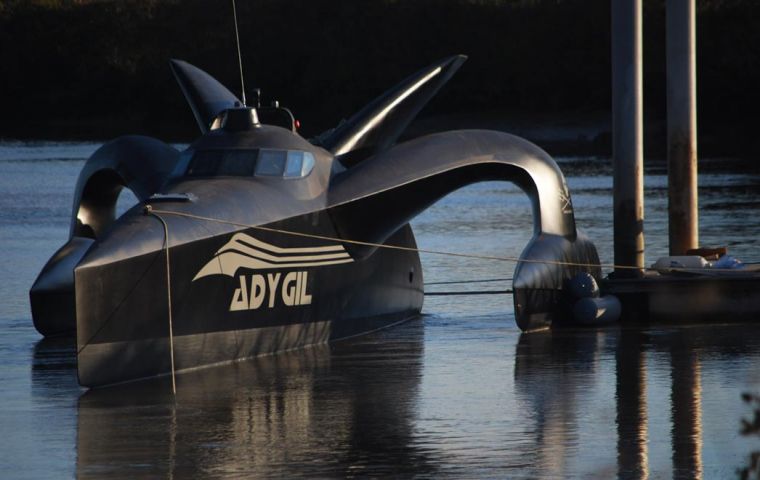MercoPress. South Atlantic News Agency
Scaring Japanese whalers with an eerie intimidating Maori chant
 The carbon-fibre Ady Gil trimaran to the rescue of whales
The carbon-fibre Ady Gil trimaran to the rescue of whales An international conservation society is using a small, space-age-like vessel to scare off whaling fleets from Antarctic waters, with a ghostly tune as its main weapon. The Ady Gil, a 24 metre carbon-fibre wave-piercing trimaran that runs on low-emission, renewable fuels, is the latest addition to the Sea Shepherd Conversation Society's protest fleet against Japan's yearly whale hunt near Antarctica, which is set to begin.
“It's a tough environment for a little boat like this and I am nervous, as Antarctica is one of the most hostile places on earth,” Peter Bethune, skipper of the Ady Gil, told Reuters in Hobart, Tasmania, just before setting off for the Southern Ocean.
“But if you've got a green bone in your body then you can't sit back and watch what they are doing, so hopefully we will find where the Japanese are and we can get on to them.”
Bethune said the materials, and the paint, on the ship made it more difficult for radars to detect, enabling it to sneak up on the whaling vessels speedily.
Japan says whaling is a cultural tradition, and while most Japanese do not eat whale meat regularly, many are bemused by accusations that the practice is cruel given that other cultures hunt many other wild animals without as much controversy.
Japan's whaling fleet is currently en route to the Southern Ocean to harpoon up to 935 minke whales and 50 fin whales, classified as endangered.
Waiting for them this year will be the Ady Gil, formerly known as Earthrace, which holds the world record for the fastest circumnavigation of the globe by a motorised boat.
Bethune said the vessel's crew of six (from Australia, South Africa, the Netherlands and New Zealand) was expecting the Japanese whaling ships to put up a fight.
“It's hard to say what minke or fin whale is worth but it's somewhere between 100,000 and 400,000 USD so you don't give up that sort of money that easily,” he said.
The crew, however, only intend to fight back with intimidating music based on a Maori chant and written by New Zealand artist Tiki Taane.
Bethune said the eerie music, called “Tangaroa” or “Guardian of the Sea”, would be blasted through huge speakers and should be enough to scare off the bravest of men.
“It makes the hairs on your neck stand up - it's very intimidating,” he said. “If we really go causing them some difficulties I'm going to put that track on.”
Commercial whaling was banned under a 1986 treaty, but the Japanese have continued to cull whales for research and monitor their impact on fish stocks, deflecting criticism from anti-whaling nations such as Australia, Britain and New Zealand.
Australian Prime Minister Kevin Rudd recently said his country was seriously considering mounting an international legal challenge to the annual hunt.
But Japan's new government has promised to continue its annual scientific research whaling program, saying it had no intention to review the policy that has attracted widespread diplomatic and environmental condemnation.
The Sea Shepherd, founded more than 30 years ago, works mainly on trying to stop seal clubbing, shark finning, whaling and tuna poaching. The Ady Gil is expected to spend more than three months trying to disrupt the Japanese whaling fleet in Antarctic waters




Top Comments
Disclaimer & comment rules-

Read all commentsi think they are all trying to stop something that they should not have there noses in.they don't realize what they have done to the sealing fleet in newfoundland.if they are allowed to continue with this greenpeace shit there will be families reuined all over the world
Dec 30th, 2009 - 01:43 am 0Commenting for this story is now closed.
If you have a Facebook account, become a fan and comment on our Facebook Page!